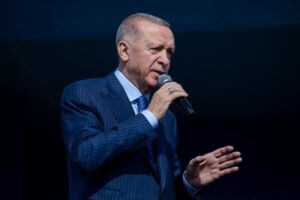American Senators Chris Van Hollen (Democrat from Maryland) and Lindsey Graham (Republican from South Carolina) have proposed severe sanctions against Turkish President Recep Tayyip Erdogan, including a ban on his entry to the United States and a thorough investigation into his assets. This action is threatened if Ankara does not compel the fighters under its control in Syria to agree to a ceasefire with the U.S.-backed Kurdish forces in the country’s northeast, which is in turmoil following the collapse of the Assad regime.
Van Hollen and Graham stated that Turkey “refused to extend the ceasefire and rejected the proposal to create a demilitarized zone along the border, particularly in the city of Kobani.” As a result, they are prepared to introduce legislation this week to impose sanctions on Turkey.
The proposed framework, building on similar 2019 legislation that led to Turkey and its allied forces agreeing to a ceasefire with the Kurds, includes sanctions on senior Turkish officials, including Erdoğan, major Turkish banks, military transactions, and energy sector activities supporting Turkey’s armed forces.
Specifically, the U.S. Treasury Department would be required to impose sanctions under federal law regarding Turkey’s decision to acquire the Russian S-400 missile defense system, while military aid from the U.S. to Turkey would be prohibited.
Furthermore, Erdoğan and the Turkish leadership would be banned from visiting the United States, and an in-depth investigation into Erdoğan’s assets would be conducted amidst allegations of corruption.
The two senators acknowledge Turkey’s “legitimate security concerns (in the region)” but emphasize that “developments are undermining regional security, and the United States cannot remain idle.” “In the wake of the Assad regime’s collapse, Turkish-backed forces have increased attacks on our Kurdish partners in Syria, once again threatening the critical mission of preventing ISIS’s resurgence,” they highlight.
The U.S. maintains approximately 900 troops in northeastern Syria, supporting the Syrian Democratic Forces (SDF) in their efforts to prevent the re-emergence of the terrorist organization ISIS. Turkey, on the other hand, considers Syrian Kurdish groups to be terrorist offshoots of the PKK and has repeatedly clashed with the U.S. over Washington’s support for the Kurds, who have proven to be the most effective ground force in battles against ISIS in recent years.
The Turkish-backed Syrian National Army, one of the armed groups involved in toppling Assad earlier this month, reportedly ended on Monday a ceasefire brokered by the U.S. that had halted clashes with the Kurds in the northern Syrian city of Manbij. The policy of the new Trump administration, set to take office on January 20, regarding Syria remains unclear.
The president-elect has stated that the U.S. “should have no involvement” in Syria and, during his first term, sought to withdraw American troops supporting the Syrian Democratic Forces.
Ask me anything
Explore related questions





